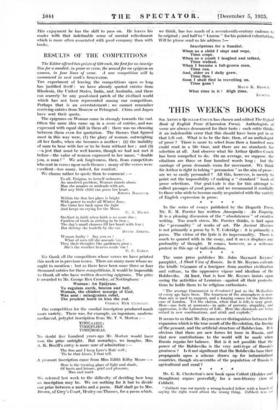The same press publishes Mr. John Maynard Keynes' pamphlet, A
Short View of Russia. In it Mr. Keynes extends the kindly tolerance of a foreigner, from another civilization and culttire, to the oppressive vigour and idealism of the Bolsheviks. At least, that is how Mr. Keynes insists upon
seeing the activities of Leninism— against all their protesta- tions he holds them to be religious enthusiasts.
" The average Communist is divolaurW just as the Methodists of every. ago have been. The tenseness of the atmosphere is ram than one is used to support, and a longing comes for the frivolous ease of London. Yet the elation, when that is felt, is very great. Here—one feels at moments—in spite of poverty, stupidity, and . oppression, is-the Laboratory of Life.. Here the chemicals arc being mixed in new combinations, and stink and explode."
It seems to us that Mr. Keynes never distinguishes between the . expansion which is the true result of the Revolution, the freeing of the peasant, and the artificial structure of Bolshevism. It is obvious that there arc new forces let loose in Russia, and that new contributions to the world will be made when Russia regains her balance. But is it not possible that the power of the Bolsheviks -is the very anti-type of Russia's greatness ? Is it not significant that the Bolsheviks base their
propaganda upon a scheme drawn up for industrialized countries, though six-sevenths of the population of Russia is agricultural and rural ? * *


































































 Previous page
Previous page